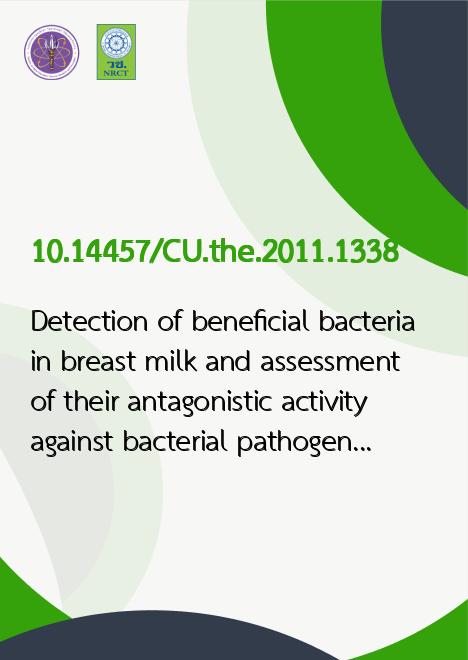| Abstract |
Breast milk is an important nutrient for neonates and plays role in the initiation of the neonatal gut microbiota. This study aimed to isolate beneficial bacteria including lactobacilli, bifidobacteria and streptococci from breast milk and assess their antagonistic activity against bacterial pathogens including enterotoxigenic E .coli (ETEC), enteroinvasive E. coli (EIEC), enteropathogenic E. coli (EPEC), enterohemorrhagic E. coli (EHEC), Salmonella Typhimurium, Shigella flexneri, Vibrio cholerae, Helicobacter pylori and methicillin-resistant Staphylococcus aureus (MRSA). Breast milk samples were collected from Thai healthy mothers (n=102) lactating at range 15-60 days. Lactobacillus, Bifidobacterium and Streptococcus species were identified by 16S rRNA gene sequencing and tested for their antagonistic activity against bacterial pathogens by agar spot method. Forty isolates of Lactobacillus which were L. gasseri, L. salivarius, L. fermentum, L. mucosae, L. rhamnosus, L. casei, L. plantarum and L. oris were recovered from 37 (36.27%) milk samples. Thirty-three isolates of Bifidobacterium including B. longum, B. breve, B. psedocatenulatum, B. dentium and B. bifidum were recovered from 31 (30.39%) milk samples. Twenty-six isolates of Streptococcus including S. salivarius, S. lactarius, Streptococcus sp., Streptococcus mitis and Streptococcus parasangius were presented from 17 (16.67%) milk samples. PCR assay demonstrated that DNAs of lactobacilli, bifidobacteria and streptococci were detected in 94 (92.16%), 60 (58.82%) and 56 (54.90%) of 102 breast milk samples, respectively. Antagonistic activity assay demonstrated that all Lactobacillus, Bifidobacterium and Streptococcus isolates had weak, partial as microcolony and no inhibition against ETEC, EIEC, EPEC, EHEC and S. Typhimurium, respectively. Thirteen Lactobacillus isolates (Lac43, Lac44, Lac45, NL1, NL3, NL5, NL6, NL7, NL8, NL10, NL18, NL26 and NL50) and 11 Bifidobacterium isolates (Bif29, NB4, NB11, NB13, NB14, NB15, NB16, NB17, NB28, NB31 and NB40) had strong inhibitory activities against V. cholerae and S. flexneri. Furthermore, six Lactobacillus isolates (Lac 40, Lac41, NL26 NL50, NL52 and NL53) and 5 Streptococcus isolates (St10, St11, NL4, NL9 and St27) weakly inhibited the growth of MRSA. In addition, 5 Bifidobacterium isolates (NB6, NB8, NB14, NB28 and NB31) had strong inhibitory activities against H. pylori. These Lactobacillus, Bifidobacterium and Streptococcus with antagonistic activity had potential for use as probiotics against bacterial pathogens. |
